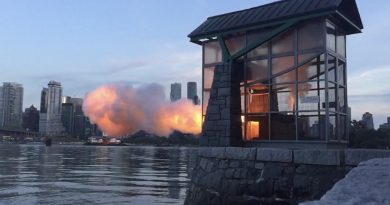Book Review
Review By John Belshaw
Everyone who has spent any time researching Vancouver history seems to have a Chuck Davis story. Here’s mine. It’s about 1980, I’m a callow not-easily-impressed grad student doing work on some arcane heritage tax law and someone suggests I call Chuck because, of course, he knows everybody. I get his answering machine – for the record, this was my very first encounter with such a contraption, which qualifies Chuck as an early adopter. What comes whispering down the line initially is car traffic, distant voices, maybe some construction noises, then “Hear that? That’s the sound of the city. And this? This is the sound of me, Chuck Davis. Leave a message.” Playful and intimately connected to the city he loved, even on his answering machine, there was something incorrigibly original and authentic about Chuck.
That’s a fact and it’s a fun fact as well. Which was Chuck’s stock in trade and the overarching theme of his latest, last, and legacy project. His original Vancouver Book, is long out of print and obsolete, though its successor, The Greater Vancouver Book (a bigger, better “urban encyclopedia”) might still be hunted to ground. Neither volume, however, are precise palimpsests for Metro. The earlier incarnations were, frankly, cheaply produced and it has taken no small effort to ensure that my copy of Greater is not mistaken for an abused phone directory destined for the recycling bin. Neither book made Chuck rich; they were, by all accounts, labours of love. But they did two things: first, they confirmed Chuck’s reputation as an archival packrat of the first order; second, they established an environment in which Metro could thrive. To be sure, Metro is not going to make Chuck any more wealthy than did its predecessors. He’s beyond that now, though not beyond the reach of praise.
Chuck (and those kind and decent folks who put their shoulders to the wheel to ensure that this book would survive Chuck’s death) set out to produce an assemblage of information meant to excite interest in the city, and in that Metropolitan Vancouver succeeds with panache. It honours and it takes to task and it does so in a way that is both delightful and personable.
It’s probably best to say what this book is not. It’s not an encyclopedia nor is it exhaustive. There are no cross-references, the index is limited and incomplete, and there are plenty of redundancies (the Woodward’s story may be found in its near entirety on three separate occasions) and there are the inevitable gaps that every reader will find, based on their special interest. Nor is the book rigid in its focus on the history of Vancouver: Chuck was an aficionado of comic strips and he makes mention of the first appearance in a Vancouver newspaper of his favourite syndicated American strips, including Pogo (not exactly a Vancouver event). This is essentially a chronology of factoids, there’s none of the analysis and little of the in-depth scrutiny found in Greater Vancouver, and Metro has a personal touch which makes it very un-encyclopaedic. The book is organized chronologically so there is a sense that this is a comprehensive day-by-day account of everything, but it’s not.
Historians will want to know how the book handles the treacherous terrain of colonialism, sexualities, patriarchy, class. Does it address them head on or does it perpetuate a vision of the past in which differential power is normalized? Yes and no. Chuck recognized oppression and he had the good sense to flag moments in the past that were, if not turning points, certainly pivotal moments, some of which may surprise the careful reader. For example, minimum wage legislation in 1924 had the effect of throwing out of work large numbers of Chinese-Vancouverites and was thus a systemic and oblique instrument of discrimination (135). At the same time, the pre-contact history of the region is given only passing attention and old chestnuts like “first White child born in Vancouver” or “first religious service on Burrard Inlet persist (while neither umpteenth Stó:lÅ child born nor millionth aboriginal spiritual event are enumerated). But it’s a book about “facts” and it is how one defines “facts” that determines much of what goes in between the hardcovers.
One can be critical but that would be both curmudgeonly and churlish and it would miss the point. Chuck (and those kind and decent folks who put their shoulders to the wheel to ensure that this book would survive Chuck’s death) set out to produce an assemblage of information meant to excite interest in the city, and in that Metropolitan Vancouver succeeds with panache. It honours and it takes to task and it does so in a way that is both delightful and personable. Every now and again Chuck has a walk-on role in his own prose, as when he says “my favourite story about…” or “I well remember….” It is like a long lunch with a charming storyteller, someone who adores the subject matter, who loves the smell of microfilm in the morning, and wants nothing more than to please the audience by demonstrating that, at the end of the day, it’s a wonderful world.
First published in BC Studies – The British Columbia Quarterly


![Crofton House ca. 1911 [Image: evelazarus.com]](https://vancouverhistory.ca/wp-content/uploads/2021/01/Alvo-Crofton-House-390x205.png)
![Sun Yat-Sen Garden [Image: The Canadian Enclyclopedia]](https://vancouverhistory.ca/wp-content/uploads/2021/01/dd1cb474-9295-42a9-b726-f7d870214d33-390x205.jpg)